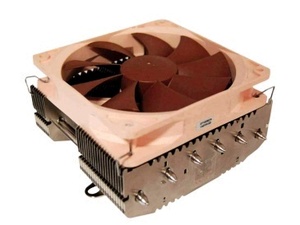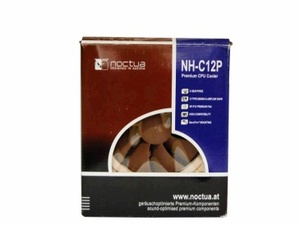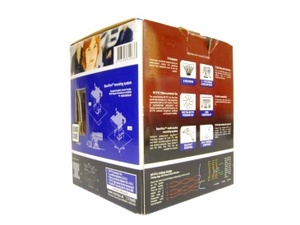Noctua NH-C12P CPU Cooler Review
July 1, 2009 | 10:14
Companies: #amd #intel #noctua #test #thermalright

Noctua NH-C12P CPU Cooler Review
Manufacturer: NoctuaUK Price (as reviewed): £53.82 (inc. VAT)
US Price (as reviewed): $64.99 (exc. Tax)
Weight: 730g (with fan)
Size (with fan): 126mm (W) x 152mm (D) x 114mm (H) (with fan)
Fan Speed: 900 or 1,300rpm
Noise Level: 12.6 or 19.8dBA
Warranty: Six years
Supported Sockets: Intel LGA775, AM2, AM2+ and AM3 (LGA1366, and AMD 754, 939, 940 and Socket F via optional mounting kits)
With the hot summer showing up for those of us in the UK, now is a good time to give your PC the once over and get it cool in preparation for those higher temperatures. If you're in the market for a new, high performing CPU cooler then you're in luck - we've seen a few superb heatsinks over the last few months with the Thermalright Ultra 120 eXtreme being the default, premium choice and the latest Titan Fenrir in particular, taking price:performance air cooling to new heights.
We've been pretty keen on anything that arrives in our lab from Noctua, with previous coolers such as the NH-U12P achieving a sublime 9/10 when we reviewed it last year. The NH-C12P is yet another solid feeling CPU cooler from Noctua, which includes the excellent NF-P12 fan. This fan is well known for superb build quality, its low noise and high static air pressure, with the latter important when we're considering real world use when dealing with the high density heatsink fins on modern CPU coolers.
The fan itself retails for over £16 at Scan at the moment, so bare this in mind before throw your wallet at your computer screen after seeing how much the NH-C12P retails for. £53 is a lot to part with, but you are getting an awesome fan for that price too.
Of course there's no point spending any amount of money on a CPU cooler that doesn't cool your cores well, or if installing it will result in so much frustration, it quickly ends up lodged in the nearest wall (we've been there and it's not pretty). Thankfully, there are no hateful, finger joint wearing pushpins to deal with here, and while there are quite a few parts to put together, we're only talking about two sprung screws and a few mounting plates for either LGA775 or AM2/AM2+/AM3. However, as the heatsink is secured using a backplate, chances are that you'll need to remove your motherboard to install it.

MSI MPG Velox 100R Chassis Review
October 14 2021 | 15:04












Want to comment? Please log in.